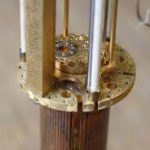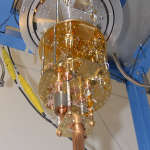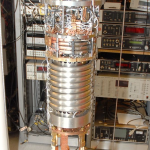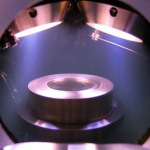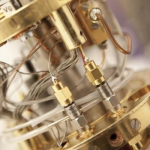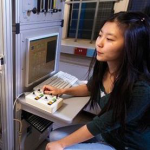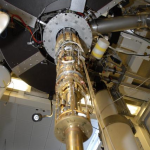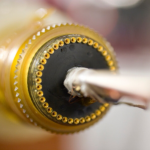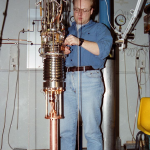

- Photon Transport in a Bose-Hubbard Chain of Superconducting Artificial Atoms
G. P. Fedorov et al., Phys. Rev. Lett. 126, 180503 (2021) - Path-Dependent Supercooling of the
He3 Superfluid A-B Transition
Dmytro Lotnyk et al., Phys. Rev. Lett. 126, 215301 (2021) - Superconductivity in an extreme strange metal
D. H. Nguyen et al., Nat Commun 12, 4341 (2021) - High-Q Silicon Nitride Drum Resonators Strongly Coupled to Gates
Xin Zhou et al., Nano Lett. 21, 5738-5744 (2021) - Measurement of the 229Th isomer energy with a magnetic micro-calorimeter
T. Sikorsky et al., Phys. Rev. Lett. 125 (2020) 142503
Metallic Magnetic Calorimeters with On-Chip dc-SQUID Readout
S. Kempf, A. Ferring, A. Fleischmann, M. Wegner, C. Enss
Metallic magnetic calorimeters (MMCs) are low-temperature particle detectors that are typically read out by using superconducting quantum interference devices (SQUIDs). But since MMCs are sensitive to the input circuitry and the noise performance of the SQUID, the energy resolution of MMCs have not yet reached their fundamental limit. A possible solution to overcome present limits is to maximize the flux coupling by minimizing parasitic inductance in the input circuit. To show the suitability of this approach, we realized a 64 pixel MMC detector array with integrated dc-SQUID readout, i.e., detector and SQUID are on the same chip. We observed an influence of the power dissipation of the SQUID on the detector temperature. We achieved a baseline energy resolution of ΔEFWHM = 25 eV and ΔEFWHM = 30 eV for X-rays with energies up to 6 keV.
J. Low Temp. Phys. (2015)
doi: 10.1007/s10909-015-1337-3


